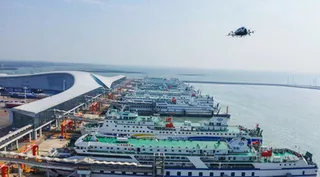GPS Signal Loss Events Surge 220% as APATS 2025 Tackles Aviation's Invisible Threat
Contact Our Team
For more information about how Halldale can add value to your marketing and promotional campaigns or to discuss event exhibitor and sponsorship opportunities, contact our team to find out more
The Americas -
holly.foster@halldale.com
Rest of World -
jeremy@halldale.com
.jpg/r%5Bwidth%5D=320/17086610-4cea-11f0-be16-33598263851a-Stefan%20Dudda%20-%201200x900%20(1).webp)
GPS signal loss events have skyrocketed 220% between 2021 and 2024, according to IATA data released Wednesday (June 18) as part of a new comprehensive plan to combat escalating GPS jamming and spoofing threats.
The International Air Transport Association and European Union Aviation Safety Agency published their joint mitigation strategy following a workshop that highlighted the rapidly evolving nature of GPS interference.
The timing coincides with APATS 2025's opening day panel discussion on GPS jamming and spoofing, where industry leaders will address the training implications of what EASA's Flight Standards Director Jesper Rasmussen calls a shift from "containing GNSS interference" to "building resilience."
The dramatic increase in interference incidents—concentrated in Eastern Europe and the Middle East but occurring globally—has moved GPS disruption to a challenge requiring fundamental changes in pilot and controller training.
IATA Senior Vice President Nick Careen warns that "with continued geopolitical tensions, it is difficult to see this trend reversing in the near term."
Register for APATS 2025APATS 2025's GPS jamming panel, scheduled for 1630-1800 on the opening day in Singapore, brings together key figures developing the industry's training response:
- Roshan Joshi, Technical Director, Association of Asia Pacific Airlines
- Paul Maher, Deputy Chief Pilot 747/777/787, Boeing Flight Technical & Safety
- Captain Sander Van Bergen, Head of Training ATC Beijing, Airbus
- Stefano Oprandi, Flight Crew Training Expert, EASA
The panel will explore how training programs must evolve to address the IATA/EASA report's recommendations for improved information gathering, stronger mitigation measures, and enhanced coordination between civil and military air traffic management.
"The 220% increase in GPS signal loss events represents more than just a technical challenge—it's fundamentally reshaping how we must train the next generation of pilots and controllers," said Jacques Drappier, APATS 2025 Conference Chair.
"Our panel discussion will focus on practical solutions that training organisations can implement immediately to address this evolving threat landscape."
The IATA/EASA workshop conclusions emphasise that effective mitigation requires comprehensive training that enables crews and controllers to maintain safety standards despite unreliable GPS signals. This makes the APATS 2025 discussion particularly timely for the region's training community.
Make sure you join us from August 26-27th at Marina Bay Sands in Singapore and ensure you are part of the conversation.


